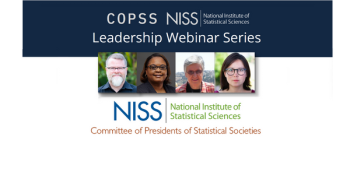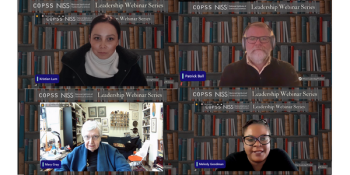

The COPSS-NISS Leadership Webinar Series hosted another session on February 28, 2023 on Social Justice and Community Leadership!
Kristian Lum was our moderator for this session on Social Justice and community leadership in the field of statistics. Kristian is a member of the 2022 class of the COPSS Leadership Academy (Committee of Presidents of Statistical Societies). COPSS is made-up of various statistical societies ASA, ENR, WNAR, IMS and the Statistical Society of Canada along with many friends of societies from across the globe. As member of the leadership academy, there is an opportunity to share our vision of leadership with the field and this is the origin of this seminar series co-organized by NISS. These webinars are an opportunity to feature leaders throughout the discipline, invite them to tell their stories and share their insights. This is an opportunity to celebrate statisticians and data scientists who have achieved great things and have inspired others in many different ways. The theme of today's panel is social justice and community leadership.
Each of our speakers has been a pioneer in using statistics to promote human rights and social justice. Patrick Ball is the director of research at the human rights data analysis group where he uses statistics to hold war criminals accountable. Melody Goodman is the vice Dean for research and a professor of Biostatistics at the NYU school of global health. Her work has focused on developing solutions for improving health and minority and medically underserved communities. Mary Gray is a distinguished professor of mathematics and statistics at American University, she’s also a lawyer. She has done some really interesting work on statistics for human rights, economic equity, the law and education. In this session we're heard talks from each of the speakers which was followed by a moderated Q&A from the audience’s questions.
Since 1991, Patrick Ball has been building databases and conducting statistical research. Most recently, he has used machine learning to understand evidence that human rights groups gather in ways that strengthen or provide us a way to test hypothesis in war crimes trials, trials for crimes against humanity, genocide trials, as well as truth commissions, nongovernmental human rights campaigns, and UN missions investigations.
Patrick gives an overview of what he finds day to day that are some of the more common themes that occur in statistics.
“The question that statisticians usually are trying to ask starts with “how many?” but very quickly the more interesting questions are ‘when?’ and ‘where?’ and ‘who suffered the attacks?’ and ‘who committed them?’ So the statistical questions turn on the notion of getting representative samples or if we can’t get representative samples unbiased estimates of the magnitude and pattern of crimes like murder.”
Patrick Ball
Melody Goodman is the Director of the Center for Anti Racism Social Justice and Public Health at the NYU School of Global Public Health. Melody’s interests are focused around the social and structural drivers of racial health and equities.
“I think of myself more as a generalist, I do a lot of community engaged, community-based and participatory research and I’m interested in letting those communities drive the research agenda so that my work is focused on questions that are important to people that that I can help in ways as a statistician.”
Melody Goodman
Most recently the work that Melody is known for is developing and validating a survey tool that assesses the level of non-academic partner engagement in research. This tool really helps develop the science of engagement and treat it like a science that we understand how engagement really impacts the scientific questions we ask, the scientific process and scientific discovery. Melody expressed that she was happy be a part of this conversation.
Mary Gray started out as a mathematician, but she paved her way through many disparities before she became a statistician. Here’s how her journey all started:
“I noticed whenever I went to a mathematics conference, there weren’t many women and not very many faces other than white faces around. So, I went to sort of a governing body of an American mathematics society to find out what was going on, I had to carefully check ahead of time to see that it was a public meeting, but when I got there, I was told that no, it was closed, even though it was open and then I was told this was a gentlemen’s agreement. Then I said, ‘well OK I’m not a gentleman’ so I went on to that meeting and then became known around the mathematics community for not being the gentleman, and that worked out just fine.”
Mary Gray
Mary started an organization called the Association for Women in Mathematics which is still going strong 50 years later, “as am I” – she adds. Mary started working on a discrimination case on the basis of gender and pensions, thought she had some chance of winning a case in court however when she talked to the insurance people, they told her she “just didn’t understand statistics.” Along the way, even after coming up with a very good argument she was then they told “well you may understand statistics, but you just don’t understand the law,” so then she went to law school. She eventually contributed by doing the statistical background for discrimination cases, and has worked on refugee projects with various organizations. Mary has done so much for the statistical field in this country by paving the way for many women in statistics, and has left advice for future statisticians:
“I always tell my students that if you want to have some influence in a not-for-profit organization, volunteer to be treasurer!”
Mary Gray
Managing the budget and knowing where the money is going can give people a better outlook on how to fund various activities. Mary participated in advancing women’s rights in America and had to testified in various legislatures because nobody else wanted to talk about the numbers.
“I still keep on going that way, doing a variety of things having to do with discrimination and having to do with human rights.”
Mary Gray
There will be more of these events coming each month! If you feel inspired to do so, please post about this event or upcoming events in this series using the #statsleadershipwebinar on your social media platform of choice!
Check out the full video recording of this event below. View more like this our NISS Communications YouTube Channel here: https://www.youtube.com/@NISSCommunications/playlists
